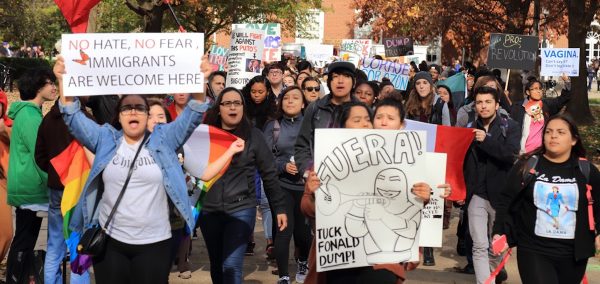
A Harvard historian explains how young people can resist Trump’s America
‘I would urge people who are worried about the worst things he says to get organized now’
In less than a week, Donald Trump will become America’s 45th president.
His campaign targeted and victimized a variety of groups – from minorities and child immigrants to New Jersey and John Oliver. Perhaps as a result, he got very little support from millennials:
So what will a Trump presidency mean for the millions of frustrated college students among them? To find out, I sat down with Paul Adler, a lecturer at Harvard University specializing in post-1945 American social movements. As it turns out, we’re more powerful than we realize.
“College students in a number of countries have been a real force for progressive activism,” he told me. “To be honest, because they are young, and tend not to have their own families, they are more able to take risks. Depending on what the Trump agenda looks like, thinking historically, there’s going to be room for college students to mobilize around a whole host of issues.”
He described the bold, law-breaking protesters of the anti-apartheid and anti-Vietnam movements, who “have done everything from organized student unions to mass protests to joining resistance movements.”
In 2017, protest can take many different forms. According to Adler, state and local action might vary “from lobbying state legislatures to preserve health care benefits to physically blockading the construction of new coal-fired power plants or natural gas pipelines.” Less political alternatives include “developing marketable, economically profitable companies based on renewable technologies” and “mobilizing to have [our school] administrations be voices and power centers challenging the government.” Online, too, we can organize through petitions, advertisements, and fundraising campaigns.
Harvard’s Paul Adler
Unfortunately, there is still a lot of uncertainty. “I don’t think anyone really knows, including Donald Trump himself, what Donald Trump’s presidency is going to be like,” Adler admits. “His cabinet nominees reflect far-right perspective on issues from civil rights to foreign policy, and I think he will definitely move on long-standing GOP priorities… but who knows, for example, how the scandals over Trump and Russian interference in the election will shape his presidency or whether his policies will provoke a recession?” He believes that demographic change and the evolution of “whiteness” will probably determine what kind of presidency we see. In any case, he “would urge people who are worried about the worst things he says to get organized now.”
College students have long played a critical role in America’s progressive movements. Regardless of Trump’s agenda, we have enough time, passion, and education to be effective activists and organizers.
Start here: sign petitions opposing his picks for attorney general and the EPA, donate to progressive charities, and join the women’s march on the day of his inauguration.
